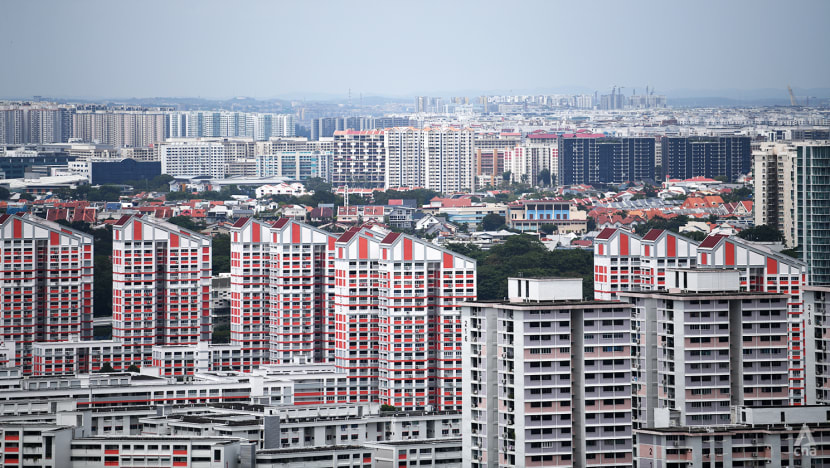Retirement checklist: Property planning for future financial security
Having a fully paid-up home is top of the retirement checklist for most of us. Money Mind looks at the best way of getting to that goal, as well as some ways to monetise your property for more financial security.

HDB flats and private properties in Singapore. (Photo: CNA/Calvin Oh)
SINGAPORE: A home is the biggest financial commitment for most people.
When buying a home, several factors can have an impact on how much cash one will have left to enjoy in their retirement years.
Such factors include how much to borrow, the duration of the loan and the monthly repayments.
Financial advisers say it may be prudent to get a longer loan tenure as this frees up cash to plan for retirement.
Mr Vinod Nair, CEO of personal finance comparison website MoneySmart, said this makes sense in a low interest rate environment.
“Take the longest loan tenure that is available to you. And then, as and when you can afford to make partial prepayments, use those discretionary funds to pay down your mortgage.
"One of the reasons why we recommend this is typically your money yields better returns in investment instruments rather than paying down your mortgage. And with interest rates being so low, you want to leverage those low interest rates to make your money work harder for you in your investments, rather than paying down your mortgage.”
The maximum loan tenure for housing loans is 30 years for HDB flats, and 35 years for private property.
Singapore has additional safeguards to prevent homeowners from overextending themselves.
Only a maximum 30 per cent of gross monthly income can go towards repaying all property loans.
The mortgage servicing ratio applies to loans for the purchase of HDB flats, or executive condominiums.
For private properties, the total debt servicing ratio will apply. A maximum 60 per cent of gross monthly income can be utilised for all debt repayments including property loans, car loans and any other loans.
CONSIDER INTEREST RATES
Another consideration – whether to take a fixed or a floating rate loan.
According to MoneySmart, most customers end up choosing floating rates, as rates are only fixed for a limited period.
“And if interest rates are on an increasing trend, then you know in two to three years time, the corresponding fixed rates will also end up being higher. You benefit by having a certain period of time where you have certainty in terms of your rates and your monthly payments, but eventually after that, it will go back to a floating rate,” said Mr Nair.
Because loan rates will change, experts say it is important to think of refinancing or repricing home loans after the lock-in period.
“It's good practice to regularly review what our current mortgage is compared to the mortgages that are out there in the market," said Mr Tan Chin Yu, a client adviser at Providend.
"Especially when interest rates are low, there's a good chance that what you have in the market might be better than what you have and that can result in savings over the long run. Although, it is also important to note that you might incur penalties, and there could be other fees involved when you choose to reprice or refinance, especially if you are still within the current lock-in period of your existing loan.”
In Singapore, CPF is an additional avenue to finance property. The money in the CPF Ordinary Account can be used to pay for property downpayment, service the housing loan, and cover stamp duties and legal fees.
Those buying HDB flats can also use it to pay for their home protection scheme insurance premiums.
The amount of CPF that can be used depends on several factors, such as whether it is an HDB or bank loan, whether CPF is being used to service more than one property, as well as the property’s remaining lease.
However, the more CPF money used on property means there may be less for retirement.
It all boils down to each person’s investment choices, said Mr Tan.
“If you have this cash sitting in the bank that is giving you a lower rate of return than what CPF is giving you, then it's better to use the cash to pay for your housing, leave your CPF untouched and let it grow at that guaranteed 2.5 per cent (interest rate).
"But if you are investing this cash reliably and getting a return higher than what the CPF Ordinary Account is giving you, then you can consider using your CPF to pay for housing, and then in turn using this cash to invest and at some point in the future use it for your retirement as well.”
As one nears retirement and their house is fully paid up, they may end up being asset rich but cash poor, cautioned experts.
RIGHT-SIZING PROPERTIES
One option is right-sizing their property. This option is particularly suitable for those whose children have grown up and no longer live in the family home.
Another possibility for supplementing retirement income is to rent out a room.
If these are not viable options, HDB flat owners have another way to monetise their flats.
“The lease buyback scheme for HDB is one option for people to live in the homes that they grew up in. They can age in place while unlocking cash as a result," said Mr Nair.
"But you have to take into consideration that you will not have an asset to pass down to your children. If your children are financially stable and are not reliant or dependent on this cash, then it's a good way to unlock some free cash during your retirement years.”
Private property owners now have a similar option.
The DBS Home Equity Income Loan allows seniors to use their fully paid property as collateral for a loan to top up their retirement account.
The loan amount will be used for CPF Life premiums, which currently earn 4 per cent interest per annum.
The maximum loan amount is the amount required to top up to the Enhanced Retirement Sum, which is S$279,000 this year.
There are no monthly loan repayments.
The loan amount and accrued interest are payable only at maturity.
But financial advisers say that those interested need to remember that all loans need to be paid back at some point in time.
“So for this case, it could be that your loved ones, if you're no longer around, they need to deal with this loan and pay back, and it could potentially need to be dealt with through your estate, and probably selling off your existing property," said Mr Tan.
"There's also a risk that you might outlive the maturity of this loan. So say if you live beyond the age of 95 years old. That also means that you then have to pay back this loan when you are still around. And then, again, that involves some way of trying to find the funds to pay back the loan, or maybe you need to downgrade your property at that point in time," he added.

















